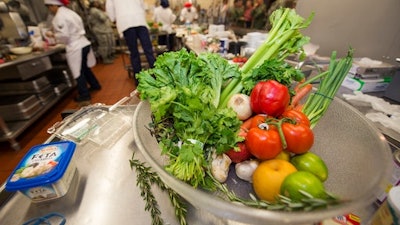
When it comes to ways to dispose of used cooking oil at restaurants, recycling is always preferable as it helps conserve resources, reduces landfill waste and may generate revenue. Used cooking oil – the waste product that was once disregarded is now in high demand as it is one of the most important raw materials to produce biofuels – a renewable solution that can help combat climate change, which is today’s No.1 issue facing society.
Restaurants and hotels across the United States produce about 3 billion pounds of used cooking oil annually, according to the Environmental Protection Agency (EPA). That’s a staggering amount of waste, but there's potential for positive change.
What many people don’t realize is that used cooking oil can be converted into renewable products such as lower-emission fuels and more sustainable plastics. It’s time to turn restaurant’s waste management challenges into an opportunity for sustainability and cost reduction. In fact, many restaurants and businesses across the globe are already embracing this practice.
Reinventing waste
As the world grapples with the effects of climate change, businesses are realizing the need for change. Electrification in hard-to-abate sectors, such as heavy-duty trucks and airplanes, will not be viable for decades, so it’s important to look at “today” solutions that will reduce greenhouse gas emissions. Many businesses and companies are now making the switch to renewable fuels, such as renewable diesel or sustainable aviation fuel (SAF), to decarbonize their operations in road transportation and corporate travels. These solutions are produced from a variety of renewable raw materials including used cooking oil.
In turn, the demand for used cooking oil and other raw materials is increasing, research from Fortune Business Insights suggests that the global used cooking oil market size was $7.09 billion in 2023 and is projected to grow from $7.54 billion in 2024 to $13.96 billion by 2032.
North America is dominating the used cooking oil markets, and restaurants across the United States are already legally required to recycle their cooking oil. There are companies that specialize in used cooking oil collection and recycling services for this very purpose. When choosing a recycler, make sure to review the company’s environmental standards to check if your used cooking oil will be recycled responsibly or better yet, distributed as feedstock to produce renewable products such as renewable diesel or SAF.
While it may seem insignificant, used cooking oil has recently become a target for theft across the country, with thieves targeting restaurant storage containers and siphoning off grease to sell it later for a profit. These incidents underscore the importance of secure storage and disposal practices for used cooking oil in restaurants. By partnering with reputable recycling services, restaurants can potentially turn their waste into a legitimate revenue stream while contributing to environmental sustainability efforts.
Beyond the environmental impact, streamlined collection and recycling services can make waste management easier for restaurant staff and alleviate the strain on infrastructure. Although you should never pour cooking oil down the drain, doing so can clog your plumbing or piping system and cause unnecessary damage, resulting in expensive repairs. Not only that, but dumping used cooking oil is also illegal in many places, meaning you could face fines or penalties. Plus, improperly disposing of used cooking oil can severely harm the environment. Discarded cooking oil can smother plants, it can be fatal to aquatic life and pollutes the environment with unpleasant odors.
That’s why recycling is the best option for your used cooking oil to give it a new life that can help combat climate change.
From the fryer to fuel
There are many success stories of how recycling used cooking oil can help businesses operate more efficiently and sustainably. Take Dallas Fort Worth International Airport (DFW) for example. With more than 200 restaurants and kiosks across a 6 million-square-foot airport terminal, collecting waste — specifically, used cooking oil — used to be complex and inefficient as each vendor had its own waste collection process and schedule.
To reduce disruptions to passengers from the used cooking oil removal process, DFW worked to establish an entirely new back-of-house operation for all restaurants and kiosks, introducing dedicated holding tanks at five locations across the airport to enhance its used cooking oil collection and management system. The new used cooking oil collection program was designed to achieve three goals: Streamline the collecting process and make it work for all businesses; reduce disruptions to passengers from the used cooking oil removal process; and create a safe environment where risks from possible spills and burns are eliminated. Now, DFW Airport’s used cooking oil is being upcycled to create lower-emission renewable fuels.
Once the impurities are removed from the used cooking oil, it is transported to a renewable product facility where renewable fuel producers convert it into renewable diesel, SAF or other renewable products. The renewable products are then distributed globally, enabling businesses and cities to reduce greenhouse gas emissions.
Renewable plastics made from used cooking oil
Besides renewable liquid fuels, used cooking oil can also be used as an important raw material for renewable plastics. A perfect example is a pilot program at select fast food chains in the United States, where multiple kinds of renewable and recycled raw materials, including used cooking oil were used to produce clear cups. The test cups are sourced from a 50-50 mix of post-consumer plastic material and biobased materials, demonstrating the possibility that plastics can be more sustainable in the future if renewable materials such as used cooking oil are leveraged. By 2050, plastics could make up 20% of global oil and gas consumption and account for 2.8 gigatons of GHG emissions per year. It’s clear that properly managing waste and residue materials is key to reducing emissions from plastics production and fighting climate change.
Looking ahead
The possibilities are endless. By reimagining the potential of used cooking oil, restaurants can be at the forefront of this revolution by recycling waste. Together, we can create a world increasingly powered by renewables. Every drop of recycled cooking oil becomes a step closer to a more sustainable world.















